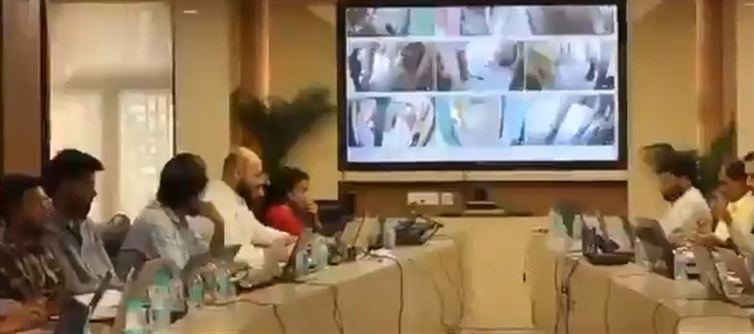
The Double Standard of ‘Transparency’
In a democracy, transparency is sacred. But in india, it’s conditional — it applies to the citizen, not the system.
Recently, the election Commission’s stance on CCTV footage from polling booths exposed this hypocrisy in plain sight.
When activists and opposition parties demanded access to polling footage to verify alleged irregularities, the Commission refused — claiming that releasing the videos would violate the “modesty” and privacy of women voters.
It sounded noble on paper.
But fast-forward to Bihar, and what do we see?
Live CCTV feeds from polling booths are being monitored by officials, politicians, and “authorized personnel” in rooms filled with men — the very scenario that was supposedly unacceptable.
When power is in their hands, privacy is forgotten.
When accountability is demanded, suddenly modesty matters.
That’s not policy. That’s selective morality.
The Optics of Opacity
What we’re witnessing isn’t democracy — it’s performance democracy.
Every election, the election commission projects itself as the ultimate guardian of fairness. It talks of robust systems, strict rules, and unbreachable integrity.
But when it comes to public verification, the shutters come down.
Footage can’t be released. Data can’t be shared. Server access is restricted.
Citizens are told to “trust the system” — a system that operates in darkness while claiming to be made of light.
If transparency truly threatens privacy, why does it only threaten it when questions are asked?
Privacy as a Shield, Not a Principle
Privacy is a noble value — but in india, it’s becoming a convenient escape hatch.
When government agencies or commissions are asked to share data, they invoke “privacy.”
When those same institutions collect citizen data — through Aadhaar, surveillance cameras, and wallet PLATFORM' target='_blank' title='digital-Latest Updates, Photos, Videos are a click away, CLICK NOW'>digital records — privacy suddenly evaporates.
The truth is simple: Privacy is not the real concern. Power is.
Control over information is the ultimate weapon in a democracy — and the election commission knows how to wield it.
The Great indian Data Illusion
We keep talking about “free and fair elections.”
But can there be fairness when data access is asymmetrical?
The election commission controls voter lists, CCTV feeds, EVM data, and counting center footage.
Political parties and citizens have no access, no verification mechanism, and no independent audit rights.
That’s not democracy — that’s data feudalism.
When only one side controls all the evidence, truth becomes whatever they decide to show you.
The Shrinking Space for Accountability
Every major institution in india now hides behind moral vocabulary — “privacy,” “national interest,” “integrity” — to avoid scrutiny.
The election Commission’s refusal to release CCTV footage is part of a larger pattern:
Courts demand reports — they delay.
Journalists ask questions — they cite confidentiality.
Citizens demand transparency — they call it misinformation.
Accountability is no longer a democratic value. It’s a liability.
The Cost of Secrecy: Erosion of Trust
Elections are not just about ballots — they’re about belief.
Belief that every vote counts. The belief that no data can be tampered with. Belief that institutions will play fair.
When that belief collapses, no number of EVMs or CCTV cameras can save legitimacy.
If footage can’t be shown, if data can’t be verified, if explanations come wrapped in moral excuses — then the very essence of democracy has already been sold for convenience.
The Future: A Democracy That Monitors You, Not Itself
This is the most chilling part — the cameras that were meant to protect democracy are now being used to monitor citizens instead.
We live in a system where the voters’ every move is recorded, but the system’s own moves are invisible.
Where the election commission sees everything, but shows nothing.
We’ve built a democracy with eyes everywhere and conscience nowhere.
Final Word: Transparency Should Not Be Selective
Accountability isn’t optional. It’s the foundation of public trust.
If CCTV footage can be viewed by officials in real time, it can also be released for audit.
You can’t invoke “privacy” when questioned, and then enjoy full access when it suits your power.
That’s not governance. That’s gaslighting.
Democracy dies not when people stop voting — but when they stop believing their vote matters.
And with every act of selective transparency, the election commission of india is asking citizens to believe in a system that no longer believes in itself.




 click and follow Indiaherald WhatsApp channel
click and follow Indiaherald WhatsApp channel